Unified
Unified
An end-to-end mobile product design project to enable actors to take back control in the modern era of self-taped auditions.
An end-to-end mobile product design project to enable actors to take back control in the modern era of self-taped auditions.
Year
Year
2024
2024
platform
platform
mobile
mobile
my roles
my roles
end to end UX/ui design
product management
UX/ui design
product
management
For a longer, slide deck version of this case study
For a longer, slide deck version
CLICK HERE
CLICK HERE
CLICK HERE




"Self-tape" Audition:
"Self-tape" Audition:
A video audition usually recorded at home by the actor and sent electronically to a casting director or creative team to be considered for a role. Generally a replacement for an in-person audition.
A video audition usually recorded at home by the actor and sent electronically to a casting director or creative team to be considered for a role. Generally a replacement for an in-person audition.
The problem
The problem
Virtual Auditions Limiting Creativity and Networking, and Doubling Competition
Virtual Auditions Limiting Creativity and Networking, and Doubling Competition
With the industry-wide take up of self-taping post-pandemic, casting teams can see more actors for roles. This means auditions double, but so too does the competition.
As an actor myself I wanted to empower actors to take back control via a digital solution. I understood personal biases would be unavoidable, however laying them out early in my scoping allowed me to work around them when they reared their ugly head.
With the industry-wide take up of self-taping post-pandemic, casting teams can see more actors for roles. This means auditions double, but so too does the competition.
As an actor myself I wanted to empower actors to take back control via a digital solution. I understood personal biases would be unavoidable, however laying them out early in my scoping allowed me to work around them when they reared their ugly head.
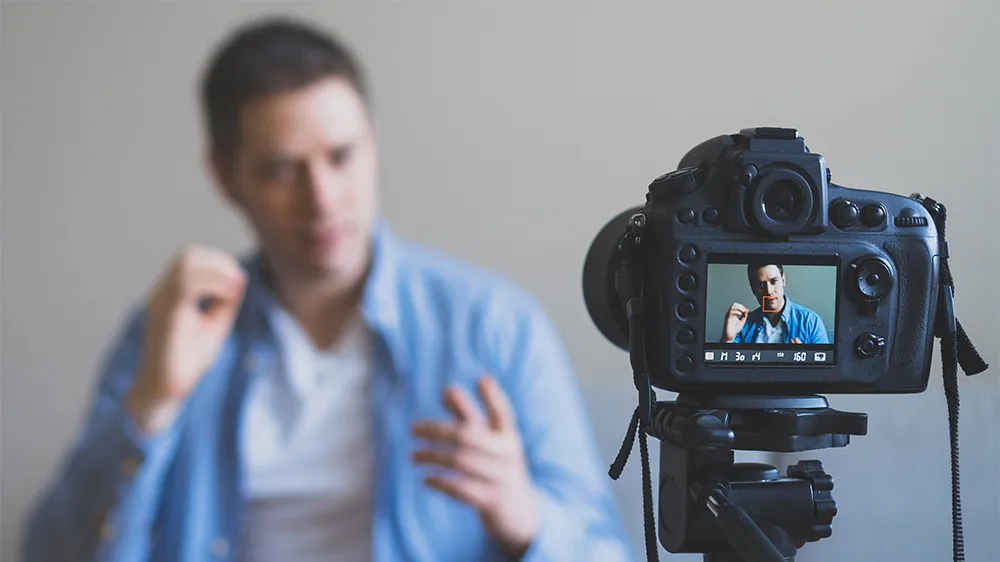


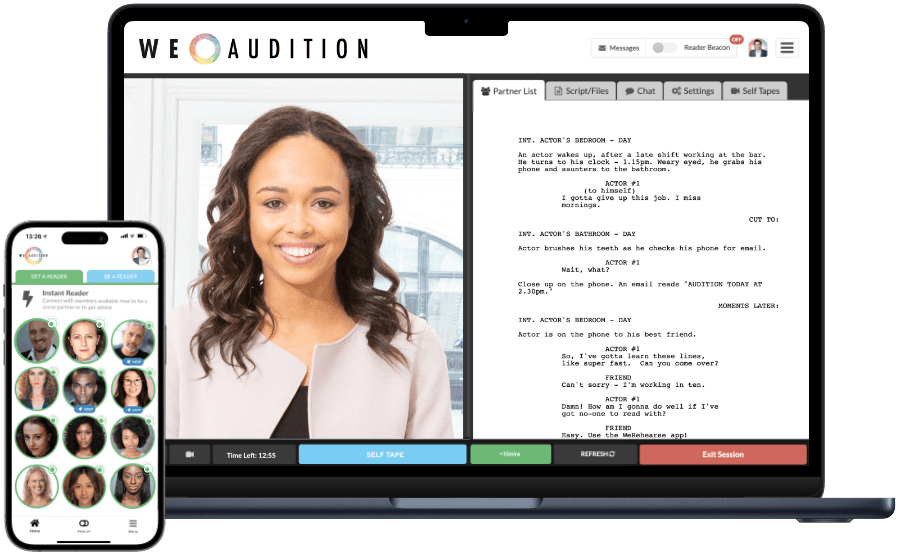



The constraints
The constraints
Systemic and Design Obstacles
Systemic and Design Obstacles
My solution had to exist within and compete with:
A large problem space with systemic, industry wide roadblocks
My own design bias as an actor
Competing market offerings with similar (yet limited) functionality
My solution had to exist within and compete with:
A large problem space with systemic, industry wide roadblocks
My own design bias as an actor
Competing market offerings with similar (yet limited) functionality
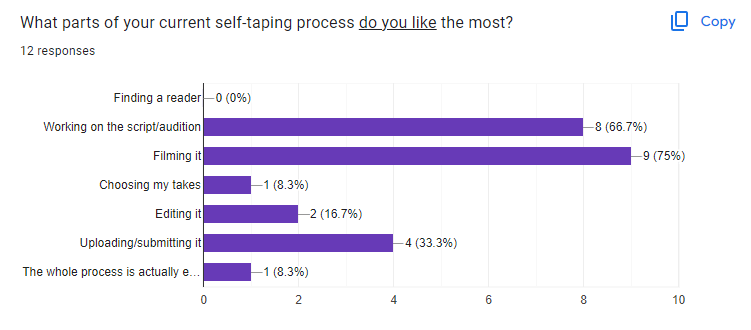



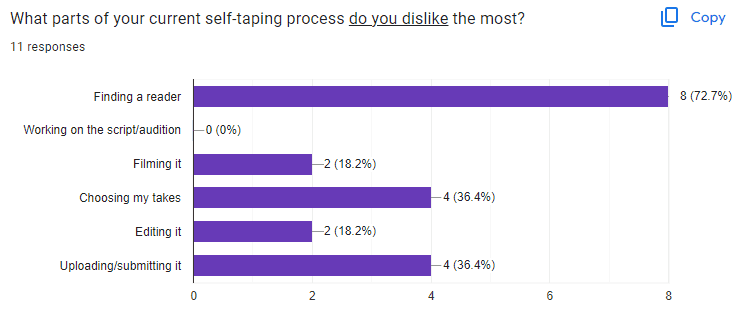



research
research
Interviews, Surveys and Desktop Discovery
Interviews, Surveys and Desktop Discovery
In order to paint as wide a picture as possible of the space (with my bias set aside for now), I conducted user interviews, wrote and distributed an online survey, and conducted a detailed competitor analysis. Translating the insights into a user persona with a user journey helped bring the target user to life.
In order to paint as wide a picture as possible of the space (with my bias set aside for now), I conducted user interviews, wrote and distributed an online survey, and conducted a detailed competitor analysis. Translating the insights into a user persona with a user journey helped bring the target user to life.
Asking the same questions two different ways to rid data of response bias.
Asking the same questions two different ways to rid data of response bias.
The actors place
The actors place
Coming to Terms With Systemic, Industry-Wide Obstacles
Coming to Terms With Systemic, Industry-Wide Obstacles
The actors' world existed within a much larger machine; with the cogs of producers, directors, and casting agencies all with their own deep-seated and problematic processes. Any solution I came up with had to operate within, yet work around these systemic issues.
The solvable problems became evident after separating the actors' issues from the rest of the industry's on the user journey.
The actors' world existed within a much larger machine; with the cogs of producers, directors, and casting agencies all with their own deep-seated and problematic processes. Any solution I came up with had to operate within, yet work around these systemic issues.
The solvable problems became evident after separating the actors' issues from the rest of the industry's on the user journey.
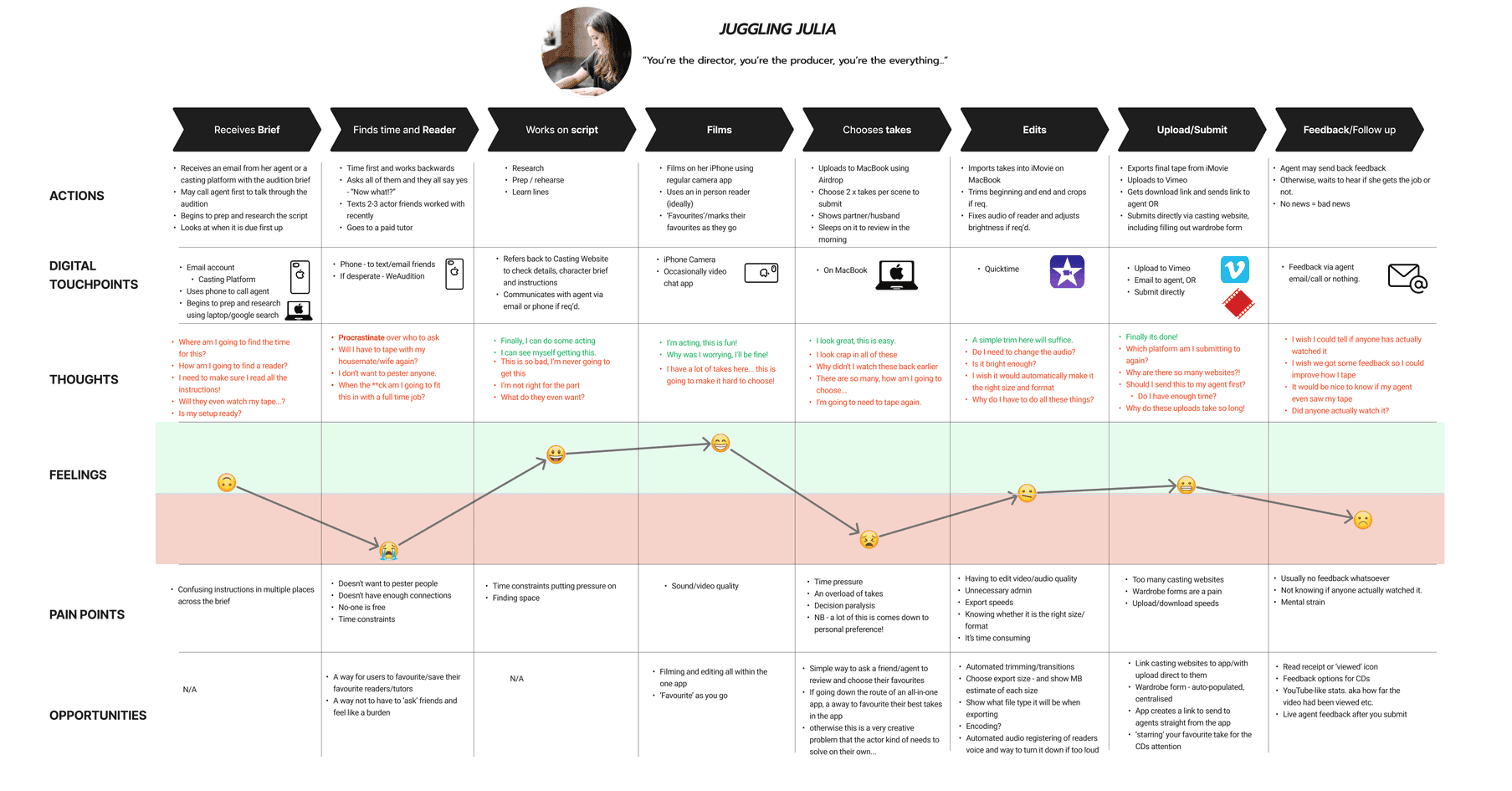


ideation
ideation
Determining Feature Viability at Each Part of the User Journey
Determining Feature Viability at Each Part of the User Journey
Situating the ideas on an MVP matrix and a process timeline helped me identify what stage of the self-tape journey each idea catered to. The later in the process an idea sat, the more it would be influenced by those systemic issues and the less solvable it became. These ideas went on to become phase 2 considerations or altogether useless features.
Situating the ideas on an MVP matrix and a process timeline helped me identify what stage of the self-tape journey each idea catered to. The later in the process an idea sat, the more it would be influenced by those systemic issues and the less solvable it became. These ideas went on to become phase 2 considerations or altogether useless features.
the roadblock
the roadblock
Overcoming Competition to Propose Unique Value
Overcoming Competition to Propose Unique Value
I realised another app was already doing all this.Which most of my research participants weren’t using… So after more research and identifying a user group I had missed, I created a new persona and tailored my MVP to them, and the app's unique value proposition became apparent.
I realised another app was already doing all this.Which most of my research participants weren’t using… So after more research and identifying a user group I had missed, I created a new persona and tailored my MVP to them, and the app's unique value proposition became apparent.
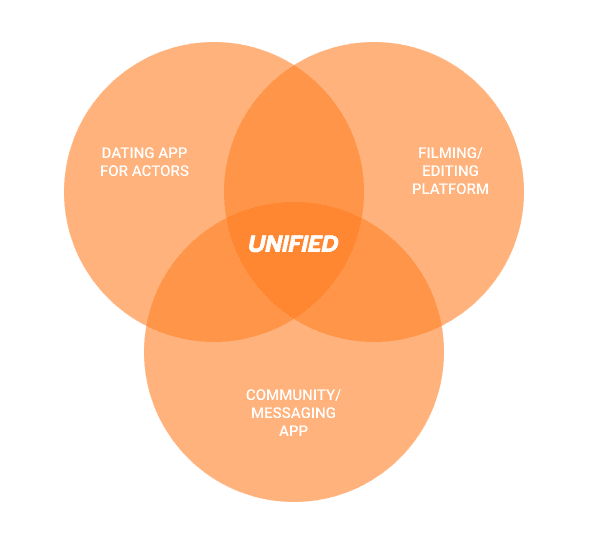


building
building
Wireframes
Wireframes
Grab to view
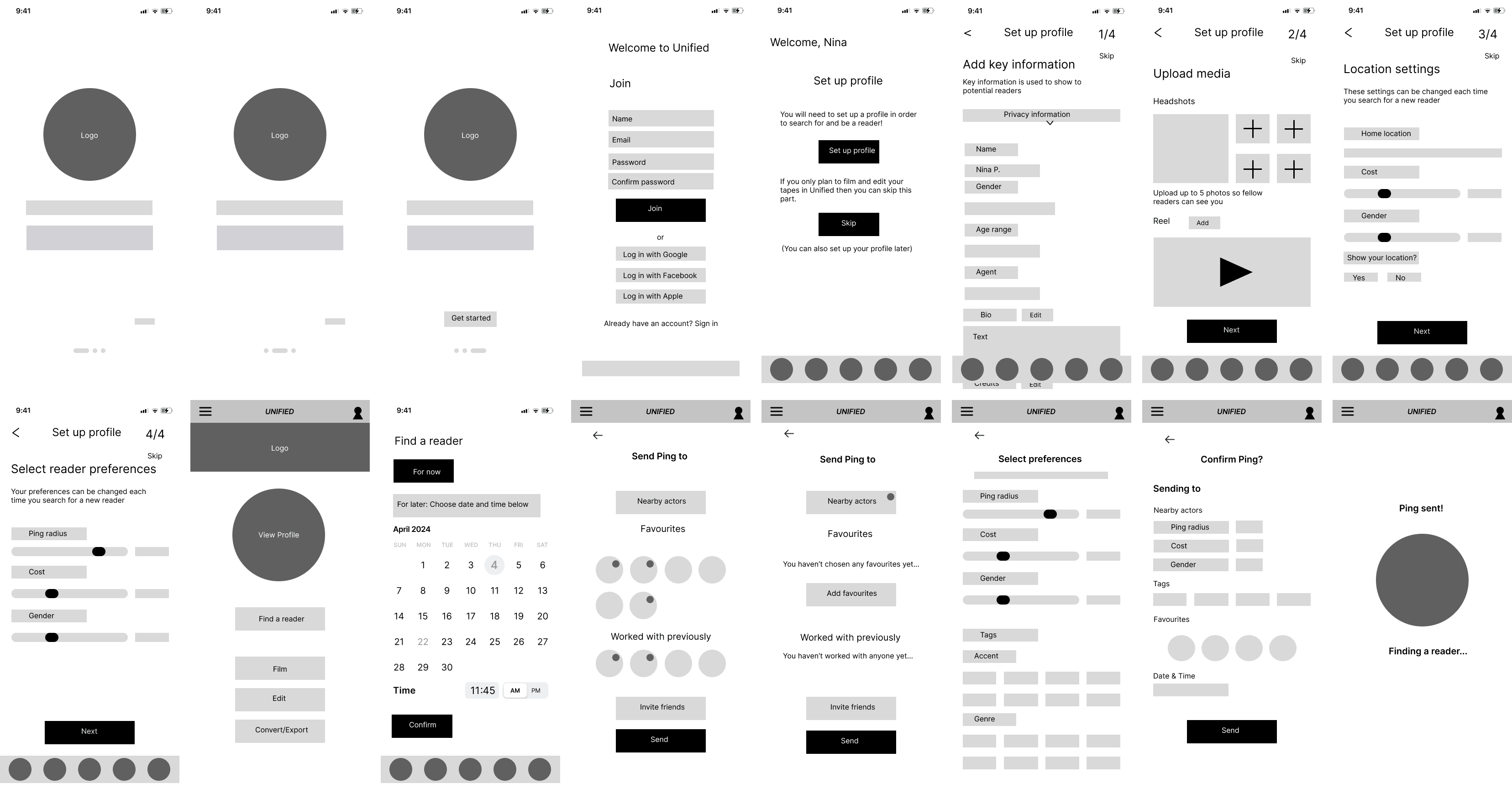

usability
usability
Testing and Iterating, Early and Often
Testing and Iterating, Early and Often
To rid any remaining design bias and obtain concrete metrics, I conducted three rounds of usability testing. One on wireframes, one on mid-fids and one on the high-fidelity prototype. The findings from these determined the major fixes and iterations.
To rid any remaining design bias and obtain concrete metrics, I conducted three rounds of usability testing. One on wireframes, one on mid-fids and one on the high-fidelity prototype. The findings from these determined the major fixes and iterations.
Home page iterations: decluttering and improving visual hierarchy
Home page iterations: decluttering and improving visual hierarchy
Terminology and languages fixes based on usability test evidence
Terminology and languages fixes based on usability test evidence
the interface
the interface
Designing for Actors From All Walks of Life
Designing for Actors From All Walks of Life
The interface had to feel sleek and modern to appeal to mostly young and tech-savvy actors, however remain accessible to actors from all walks of life. I found inspiration in boundary-pushing, rebellious brands such as Harley Davidson and Rockstar Games, as like them Unified was the new kid on the block. The final design adopted a slightly softer palette to make it more approachable and less brash.
The interface had to feel sleek and modern to appeal to mostly young and tech-savvy actors, however remain accessible to actors from all walks of life. I found inspiration in boundary-pushing, rebellious brands such as Harley Davidson and Rockstar Games, as like them Unified was the new kid on the block. The final design adopted a slightly softer palette to make it more approachable and less brash.
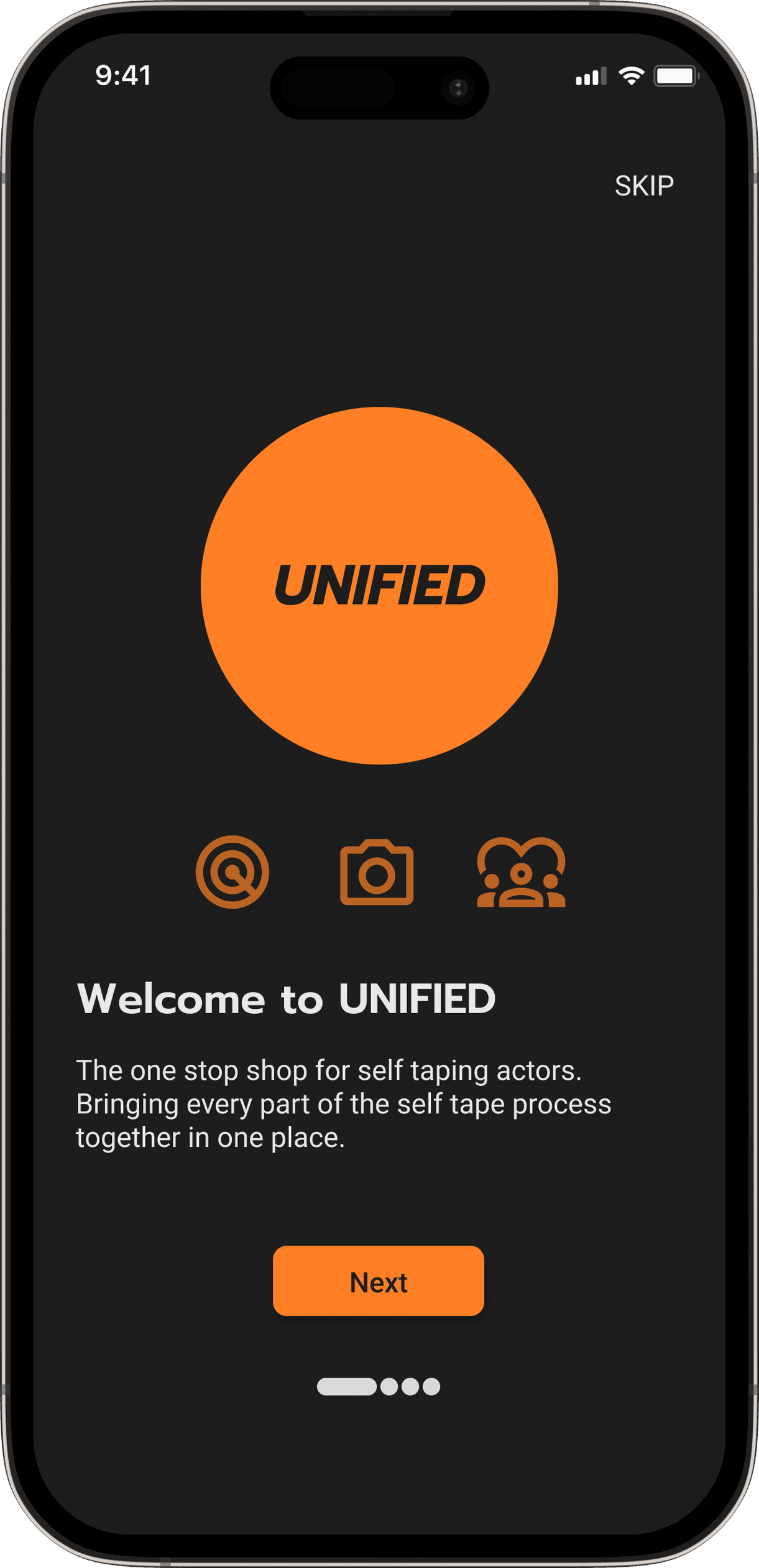

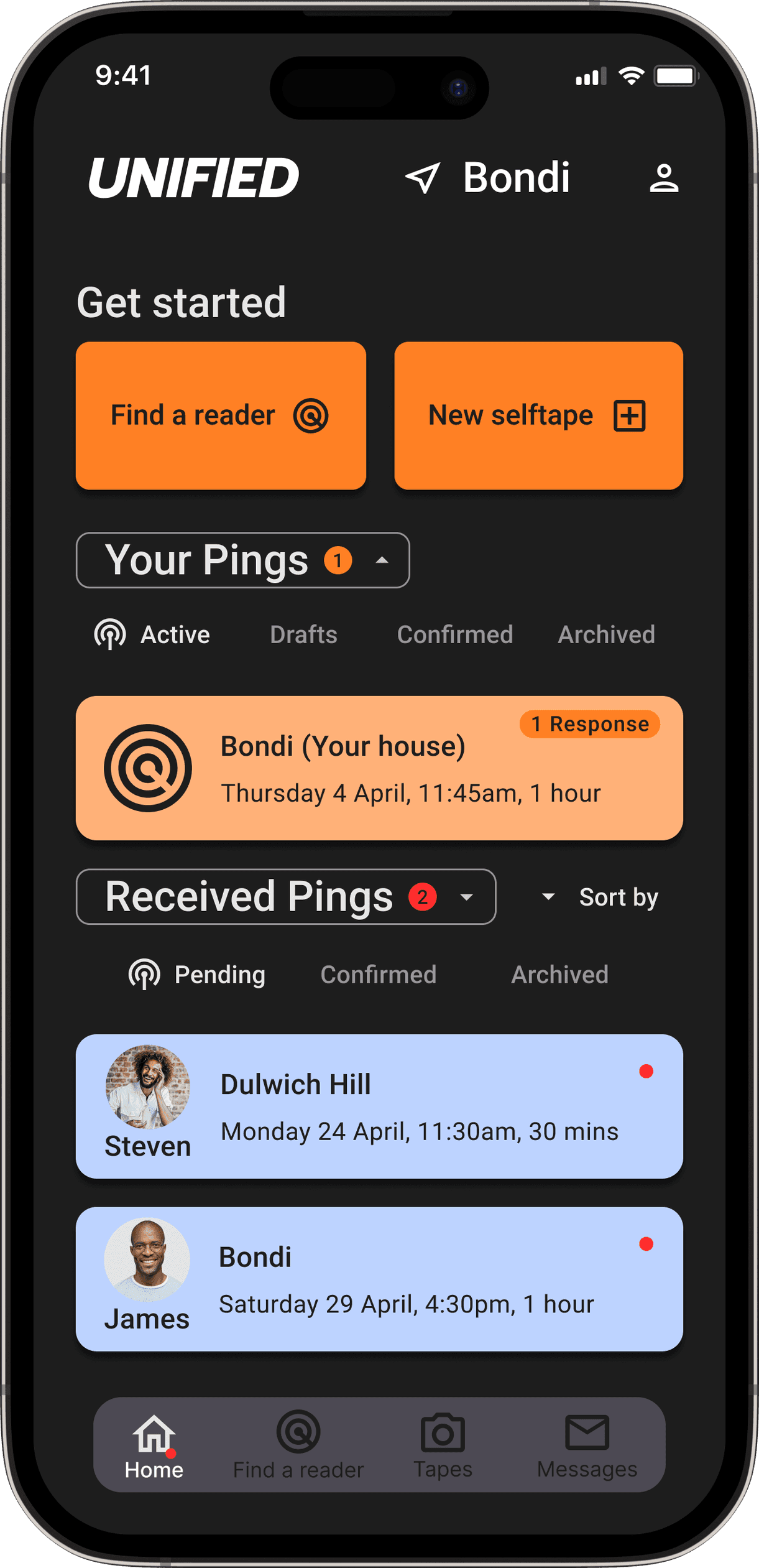

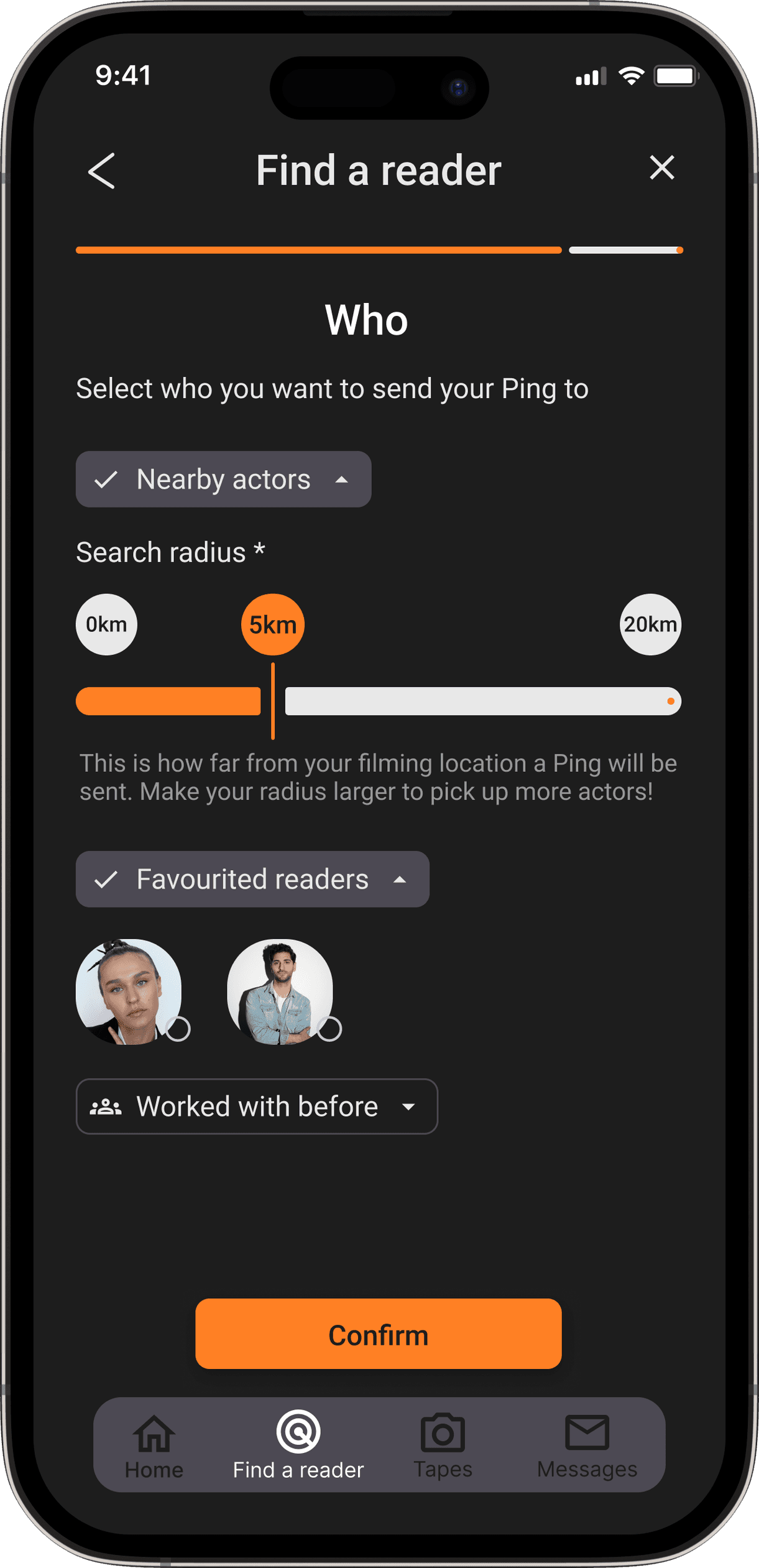




features
features
Solving the Actors' Major Pain Point
Solving the Actors' Major Pain Point
Actor's major pain point was finding a reader to help with their tapes. Unified's aptly named 'Find a Reader' feature allowed actors to locate a reader without the feelings of awkwardness and burden when asking via more traditional pathways.
Drop downs allow the interface on multiple pages to expand or contract based on the user's needs or experience levels.
Actor's major pain point was finding a reader to help with their tapes. Unified's aptly named 'Find a Reader' feature allowed actors to locate a reader without the feelings of awkwardness and burden when asking via more traditional pathways.
Drop downs allow the interface on multiple pages to expand or contract based on the user's needs or experience levels.
features
features
Third-Party Verification to Ensure User Safety
Third-Party Verification to Ensure User Safety
It was important to build trust in users that the product would vet any unwanted users.
It was important to build trust in users that the product would vet any unwanted users.
features
features
Aiding Pathfinding With Colour Coded Cards and Notifications
Aiding Pathfinding With Colour Coded Cards and Notifications
Repeated cards, colours and badges in contrasting colours helped to draw the eye.
Repeated cards, colours and badges in contrasting colours helped to draw the eye.
results
results
Stats and Quotes that Speak for Themselves
Stats and Quotes that Speak for Themselves
100%
of testers would use the 'find a reader' function
100%
of testers would use the 'find a reader' function
100%
of testers new other actors that would use Unified
100%
of testers new other actors that would use Unified
100%
were 'extremely likely' to recommend Unified to other actors
100%
were 'extremely likely' to recommend Unified to other actors
"It's SUPER comprehensive. Like, it actually is all-in-one"
“I'd genuinely consider exchanging my current self taping process for this one“
— Juliet, interviewee
"It's SUPER comprehensive. Like, it actually is all-in-one"
“I'd genuinely consider exchanging my current self taping process for this one“
— Juliet, interviewee
Other Work
Other Work
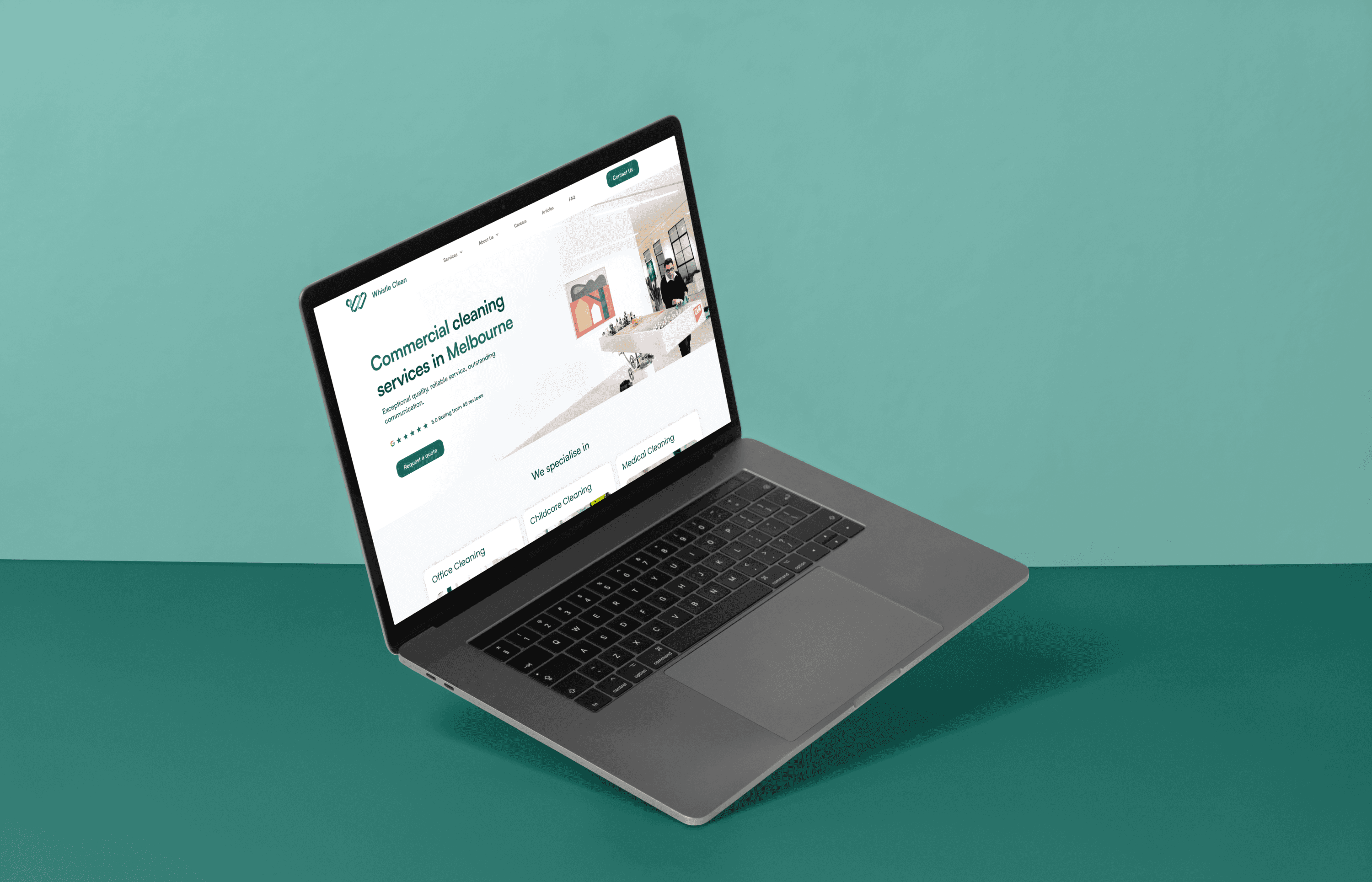
Whistle Clean
2024

Whistle Clean
2024
Elevating human stories to transform the cleaning narrative and boost SEO.

Whistle Clean
2024

Whistle Clean
2024
Elevating human stories to transform the cleaning narrative and boost SEO.
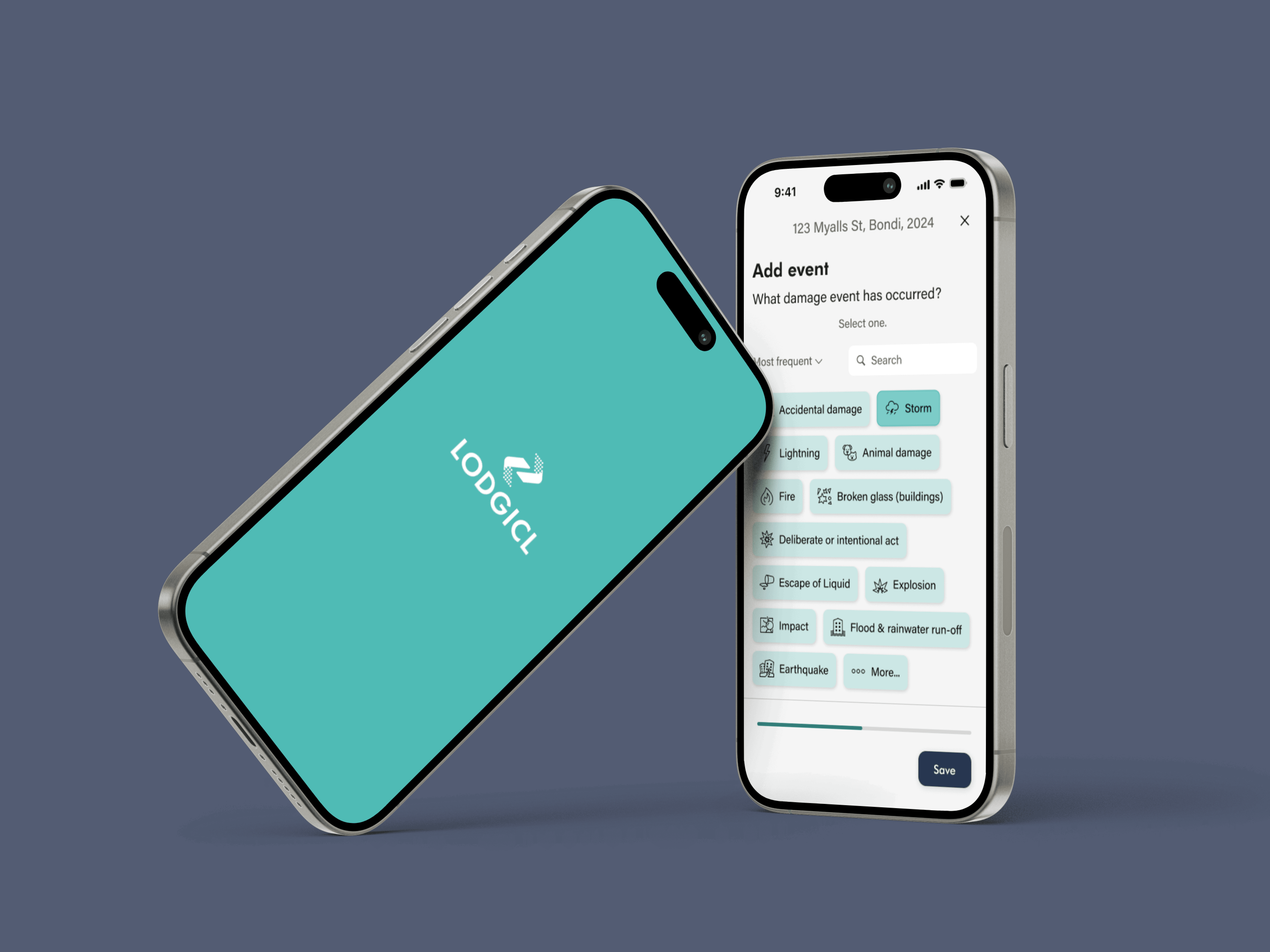
Lodgicl
2024

Lodgicl
2024
A rapid prototyping project to streamline on-the-ground insurance assessments.

Lodgicl
2024

Lodgicl
2024
A rapid prototyping project to streamline on-the-ground insurance assessments.
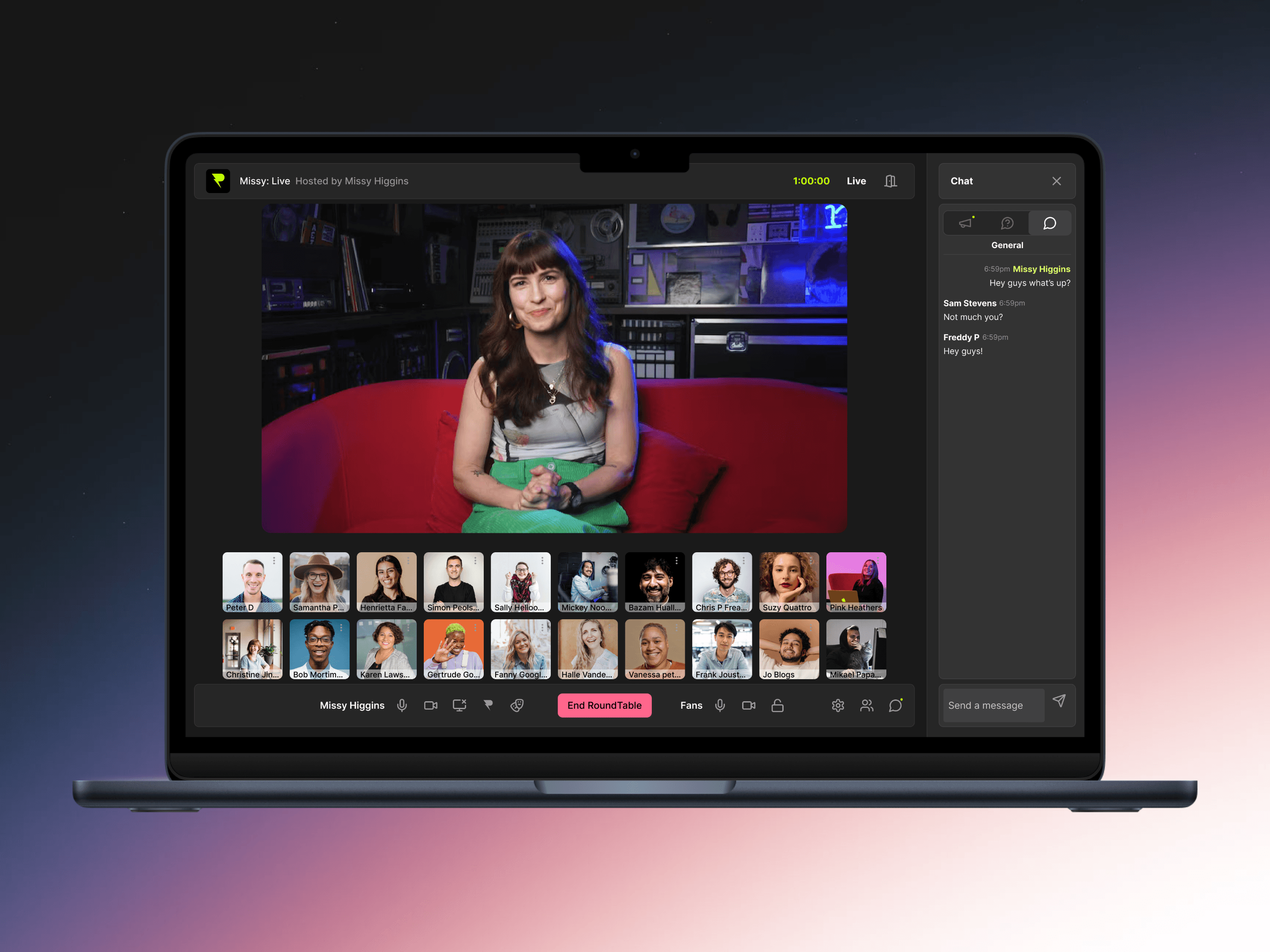
RoundTable
2025

RoundTable
2025
An MVP enabling creator and fan interactions via web-based virtual 'roundtabling'.

RoundTable
2025

RoundTable
2025
An MVP enabling creator and fan interactions via web-based virtual 'roundtabling'.
LUKAS WHITING 2024
Back to top
Back to top
LUKAS WHITING 2024
Back to top
Back to top










